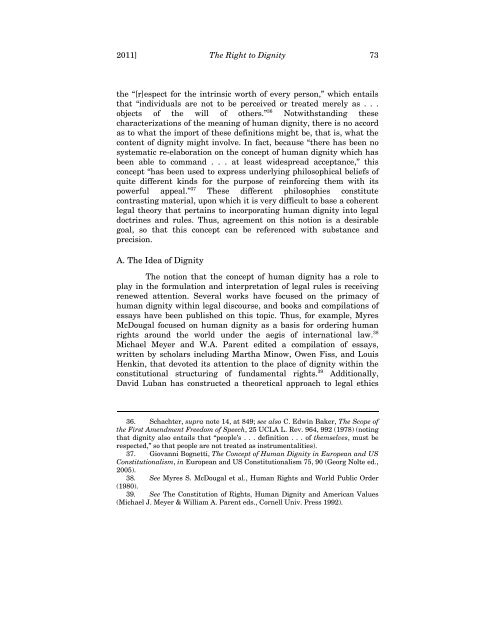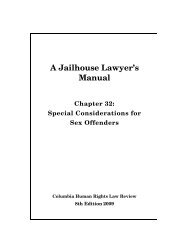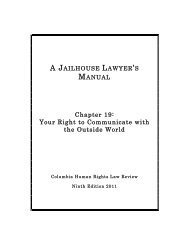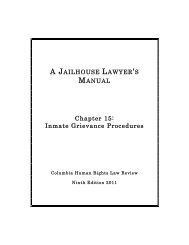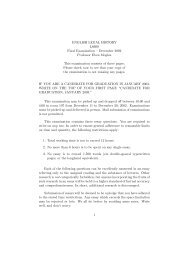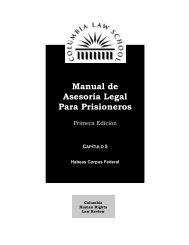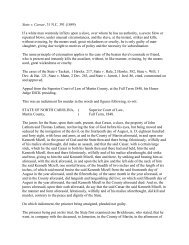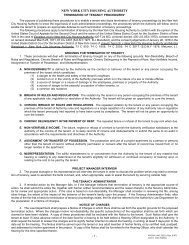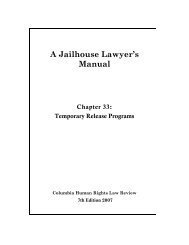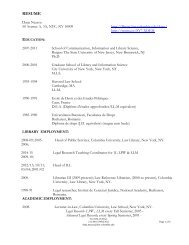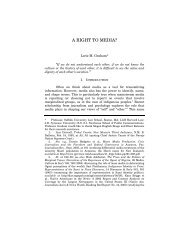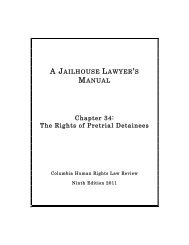The Right to Dignity Rex D. Glensy - Columbia Law School
The Right to Dignity Rex D. Glensy - Columbia Law School
The Right to Dignity Rex D. Glensy - Columbia Law School
Create successful ePaper yourself
Turn your PDF publications into a flip-book with our unique Google optimized e-Paper software.
2011] <strong>The</strong> <strong>Right</strong> <strong>to</strong> <strong>Dignity</strong> 73<br />
the “[r]espect for the intrinsic worth of every person,” which entails<br />
that “individuals are not <strong>to</strong> be perceived or treated merely as . . .<br />
objects of the will of others.” 36 Notwithstanding these<br />
characterizations of the meaning of human dignity, there is no accord<br />
as <strong>to</strong> what the import of these definitions might be, that is, what the<br />
content of dignity might involve. In fact, because “there has been no<br />
systematic reelaboration on the concept of human dignity which has<br />
been able <strong>to</strong> command . . . at least widespread acceptance,” this<br />
concept “has been used <strong>to</strong> express underlying philosophical beliefs of<br />
quite different kinds for the purpose of reinforcing them with its<br />
powerful appeal.” 37 <strong>The</strong>se different philosophies constitute<br />
contrasting material, upon which it is very difficult <strong>to</strong> base a coherent<br />
legal theory that pertains <strong>to</strong> incorporating human dignity in<strong>to</strong> legal<br />
doctrines and rules. Thus, agreement on this notion is a desirable<br />
goal, so that this concept can be referenced with substance and<br />
precision.<br />
A. <strong>The</strong> Idea of <strong>Dignity</strong><br />
<strong>The</strong> notion that the concept of human dignity has a role <strong>to</strong><br />
play in the formulation and interpretation of legal rules is receiving<br />
renewed attention. Several works have focused on the primacy of<br />
human dignity within legal discourse, and books and compilations of<br />
essays have been published on this <strong>to</strong>pic. Thus, for example, Myres<br />
McDougal focused on human dignity as a basis for ordering human<br />
rights around the world under the aegis of international law. 38<br />
Michael Meyer and W.A. Parent edited a compilation of essays,<br />
written by scholars including Martha Minow, Owen Fiss, and Louis<br />
Henkin, that devoted its attention <strong>to</strong> the place of dignity within the<br />
constitutional structuring of fundamental rights. 39 Additionally,<br />
David Luban has constructed a theoretical approach <strong>to</strong> legal ethics<br />
36. Schachter, supra note 14, at 849; see also C. Edwin Baker, <strong>The</strong> Scope of<br />
the First Amendment Freedom of Speech, 25 UCLA L. Rev. 964, 992 (1978) (noting<br />
that dignity also entails that “people’s . . . definition . . . of themselves, must be<br />
respected,” so that people are not treated as instrumentalities).<br />
37. Giovanni Bognetti, <strong>The</strong> Concept of Human <strong>Dignity</strong> in European and US<br />
Constitutionalism, in European and US Constitutionalism 75, 90 (Georg Nolte ed.,<br />
2005).<br />
38. See Myres S. McDougal et al., Human <strong>Right</strong>s and World Public Order<br />
(1980).<br />
39. See <strong>The</strong> Constitution of <strong>Right</strong>s, Human <strong>Dignity</strong> and American Values<br />
(Michael J. Meyer & William A. Parent eds., Cornell Univ. Press 1992).


